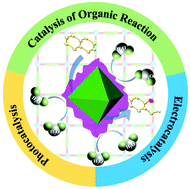The applications and prospects of hydrophobic metal–organic frameworks in catalysis
Abstract
In recent years, large numbers of hydrophobic/superhydrophobic metal–organic frameworks (MOFs) have been developed. These hydrophobic MOFs not only retain rich structural variety, highly crystalline frameworks, and uniform micropores, but they also have lower affinity towards water and boosted hydrolytic stability. Until now, there were two main strategies to prepare hydrophobic MOFs, including a one-step method and post-synthesis modification (PSM). PSM was an often-used strategy for preparing hydrophobic MOFs. Hydrophobic MOFs showed unique advantages when used as catalysts for various categories of reactions. Herein, recent research advances relating to hydrophobic MOFs in the catalytic field are presented. The catalytic activities of hydrophobic MOFs and corresponding hydrophilic ones are also compared, and the superiority of hydrophobic MOFs or MOF materials as catalysts in 10 reactions is discussed. Finally, the advantages of hydrophobic MOFs as catalysts or auxiliary materials are summarized and promising future developments of hydrophobic MOFs are highlighted.

- This article is part of the themed collection: 2020 Frontier and Perspective articles


 Please wait while we load your content...
Please wait while we load your content...